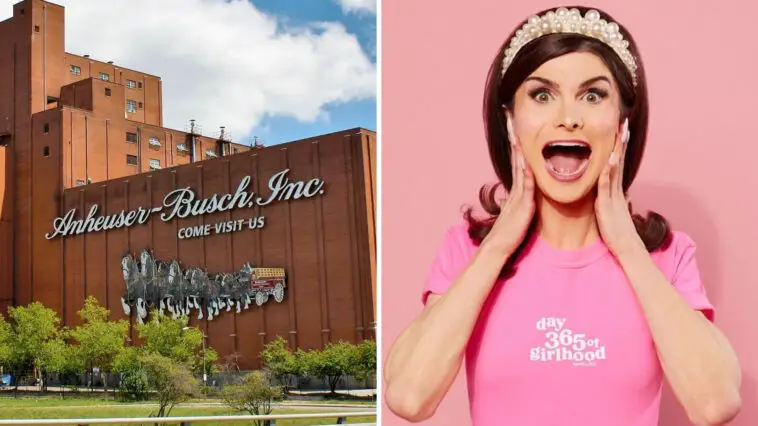It’s a rough morning-after for Anheuser-Busch InBev, the corporate powerhouse behind Bud Light, as it grapples with an unprecedented fiscal downturn due to its contentious association with TikTok influencer, Dylan Mulvaney. A sobering decrease in its share value has led to an eye-watering $27 billion evaporation of market capitalization since the start of this fateful partnership.
This controversial alliance has sparked a backlash from a substantial conservative segment of the American populace, triggering a nationwide abstention from Bud Light and the rest of Anheuser-Busch’s product lineup. The immediate and harsh market reaction epitomizes the costly consequences of placing virtue posturing ahead of understanding consumer sentiment and sound business strategies. Over the previous couple of months, Anheuser-Busch InBev’s market worth has suffered a considerable blow.
The declining trajectory of Bud Light’s parent company shares has been evident, with more than a 20% fall since the initiation of the contentious Mulvaney marketing collaboration. In early May, Anheuser-Busch’s market capitalization was a robust $130 billion. As of now, it has shrunk to a paltry $108 billion, reflecting the hefty price the company is paying for its marketing misstep.
Consequently, the corporation’s shares have plummeted to an eight-month low, hovering around the $53 mark. This stark nosedive starkly contrasts with the general uptick in the broader market. This drastic downslide was set in motion on the last day of March, a day preceding Mulvaney’s TikTok video revelation that displayed customized Bud Light cans, a tribute from the company recognizing the anniversary of her coming out as transgender.
The ripple effects of this controversial decision are not confined to the stock market alone. Anheuser-Busch’s sales figures have also been on a steady decline, falling by a tenth or more each week for the last month when compared to the corresponding week in the previous year. This is based on data from NielsenIQ, referred to by Goldman Sachs. From a market capitalization perspective, Anheuser-Busch’s losses have been massive, with a colossal $27 billion reduction over the previous eight weeks.
It’s clear that Anheuser-Busch InBev’s decision to prioritize a particular kind of socially conscious advertising over sound business strategy and an understanding of its consumer base has had substantial financial implications. As the dust settles, it’s apparent that this corporate giant is nursing a painful fiscal hangover that might take more than a hair of the dog to cure.
In the vast landscape of business decisions, Anheuser-Busch InBev’s strategic choice to associate with TikTok sensation Dylan Mulvaney for promoting Bud Light now appears as an unfortunate misstep. A gloomy financial hangover looms over the brewing titan, as it wrestles with the aftermath of this controversial collaboration. A precipitous drop in stock value has led to an eye-watering $27 billion evaporation of market capitalization, putting the company in a precarious situation since the campaign’s ill-timed launch.
It’s a stark reminder of the thin ice upon which corporations tread when they venture into socio-political arenas. This contentious alliance with Mulvaney, a trans woman with significant online influence, has drawn a backlash from a considerable portion of their conservative customer base. The resultant nationwide abstention from not just Bud Light but from Anheuser-Busch’s entire range of products has shed light on the dangers of perceived virtue posturing.
The reaction from the market has been swift and unflinching, delivering a tangible, harsh lesson in the costly repercussions of prioritizing social signaling over attuning to consumer sentiment and adhering to sound business fundamentals. Consequently, Anheuser-Busch InBev’s market worth has taken a major hit, losing significant ground over the past two months.
The alarming descent of Bud Light’s parent company shares—down more than 20% since the initiation of the Mulvaney marketing collaboration—provides a stark visual representation of the company’s current woes. This downward trajectory is in sharp contrast to early May when Anheuser-Busch’s market capitalization sat at a robust $130 billion. Fast forward to today, and that figure has shrunk to a worrying $108 billion.
This fiscal misfortune has seen the corporation’s shares plummet to an eight-month low, now hovering around the $53 mark, a stark departure from the general uptick in the broader market. The catalyst for this drastic downslide can be traced back to the last day of March, right before Mulvaney’s TikTok reveal of customized Bud Light cans.
These cans, commemorating her coming-out anniversary, signaled the company’s willingness to take a stand on social issues, a decision that, given the current financial repercussions, may have been miscalculated.
Beyond share value, Anheuser-Busch’s sales figures too have taken a beating. Sales have seen a consistent decline, falling by at least 10% each week for the last month compared to the same time last year. NielsenIQ data, corroborated by Goldman Sachs, paints a picture of a brand in crisis.
When viewed from the lens of market capitalization, the loss for Anheuser-Busch is substantial, with a mind-boggling $27 billion reduction over the last two months.
The beer brewing giant now stands at a precipice, nursing the wounds from a self-inflicted marketing faux pas. It serves as a sobering example of the cost a brand may have to pay when it strays into sensitive socio-cultural territory without a clear understanding of its diverse customer base.
Anheuser-Busch InBev’s current financial woes underscore the importance of a business strategy that is sensitive to market sentiment, acknowledging the diversity and complexity of the modern consumer. Now, all eyes are on the company as it navigates this turbulent period, with its next steps likely to be a case study for other brands in the future.



